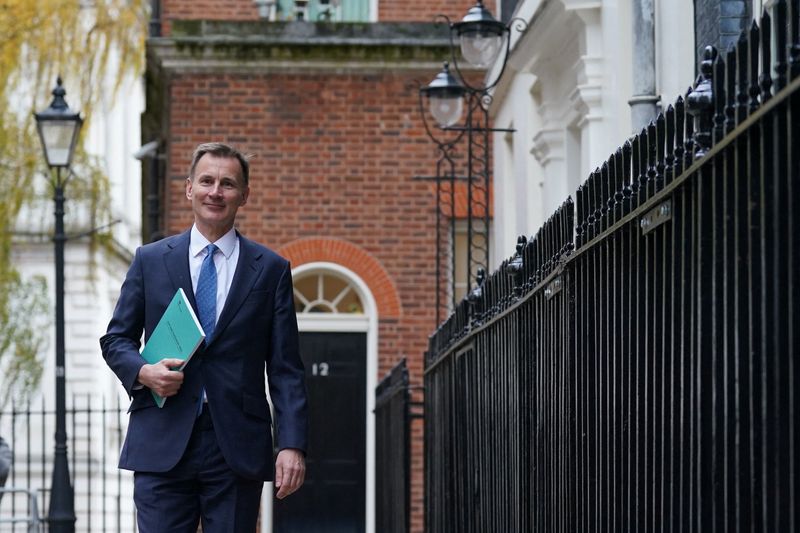By David Milliken, Kylie MacLellan and Andy Bruce
LONDON (Reuters) -British finance minister Jeremy Hunt announced tax cuts for workers before an expected 2024 election and he gave businesses permanent investment incentives in an attempt to speed up an economy that looks stuck in a rut.
Hunt also offered hefty rises in welfare payments and the state pension alongside the 2 percentage-point decrease in the rate of social security contributions for employees and a smaller reduction for self-employed workers.
The bigger-than-expected cuts will be rushed in to start in January, potentially giving an early 2024 boost to Prime Minister Rishi Sunak's Conservatives who are lagging behind the opposition Labour Party in opinion polls.
"After a global pandemic and energy crisis, we have taken difficult decisions to put our economy back on track," Hunt told parliament on Wednesday in his Autumn Statement fiscal update.
"Rather than a recession, the economy has grown. Rather than falling as predicted, real incomes have risen. Our plan for the British economy is working. But the work is not done."
The government's fiscal forecasters delivered a bleaker assessment.
They said inflation would be more persistent than previously thought and living standards would remain 3.5% lower in the 2024/25 financial year than their level before the pandemic.
And despite the new tax cuts, the overall burden of taxation was still due to rise in each of the next five years to reach a post-World War Two high of 38% of GDP, the Office for Budget Responsibility said - a record likely to leave many Conservatives uneasy about their prospects in the election.
Labour's would-be finance minister, Rachel Reeves, highlighted the weak growth outlook.
"After 13 years of the Conservatives, the economy simply isn't working. And despite all the promises today, working people are still worse off," she said.
SLUGGISH GROWTH
Britain's economy, like many others, is struggling to grow fast enough to pay for heavy demands on public spending, from healthcare and education to defence. On top of that, Hunt has to pay higher interest on a 2.6 trillion-pound debt pile.
Paul Johnson, director of the Institute for Fiscal Studies think tank, said debt as a share of GDP was set to fall only slightly over the coming years.
"That really illustrates the huge challenge that we've got: very high levels of tax, the highest historically that we have had, and apparently not very much for public services, partly because we're spending so much on that debt interest," he said.
Hunt pointed to OBR forecasts showing the government would meet its targets for the public finances, leaving open the possibility of further pre-election giveaways to voters in his full budget statement expected in early 2024.
But the OBR said that 13 billion pounds ($16.20 billion) of room for manoeuvre was less than half the average that his predecessors have had since 2010, laying bare the fiscal constraints on the government.
Hunt said measures in his plan announced on Wednesday would increase business investment by around 20 billion pounds ($25 billion) a year within a decade, or nearly 1% of GDP.
"That is the biggest ever boost for business investment in modern times," he said.
Johnson at the IFS said that change would help the economy over the longer term.
"Not all of this Autumn Statement, by any means, was just a pre-election bribe," he said. "There's real stuff in here aimed genuinely at getting the economy growing."
WEAK GROWTH
But in the short term, Britain's economy looks set to grow only slowly.
Gross domestic product is expected to expand by 0.7% in 2024, much weaker than the 1.8% forecast in the OBR's previous outlook, published in March.
The OBR also said economic output would grow by 1.4% in 2025 and by 1.9% in 2026 - weaker than its previous forecasts of 2.5% and 2.1% respectively.
Britain's economy has struggled with high inflation and the new OBR forecasts showed the consumer price index was expected to rise by 2.8% next year, up from the March forecast of 0.9%.
Some economists said there was a risk that the tax cuts, combined with a big increase in the minimum wage announced on Tuesday, could fan inflation which the Bank of England has sought to quash by taking interest rates to a 15-year high.
"It may be excessive to think it will trigger higher interest rates but potentially it could delay the point next year when the (BoE) moves to bring rates down," Philip Shaw, UK chief economist at Investec, said.
Sunak this week promised "responsible" tax cuts, mindful of last year's "mini-budget" turmoil in financial markets triggered by his predecessor Liz Truss's plans for much bigger tax cuts.
This time last year, the newly installed Sunak and Hunt raised taxes sharply to quell the bond market mayhem.

The OBR's new forecasts pointed to a slightly slower pace of government borrowing in the coming years - on average 700 million pounds less per year than forecast in March.
($1 = 0.8025 pounds)